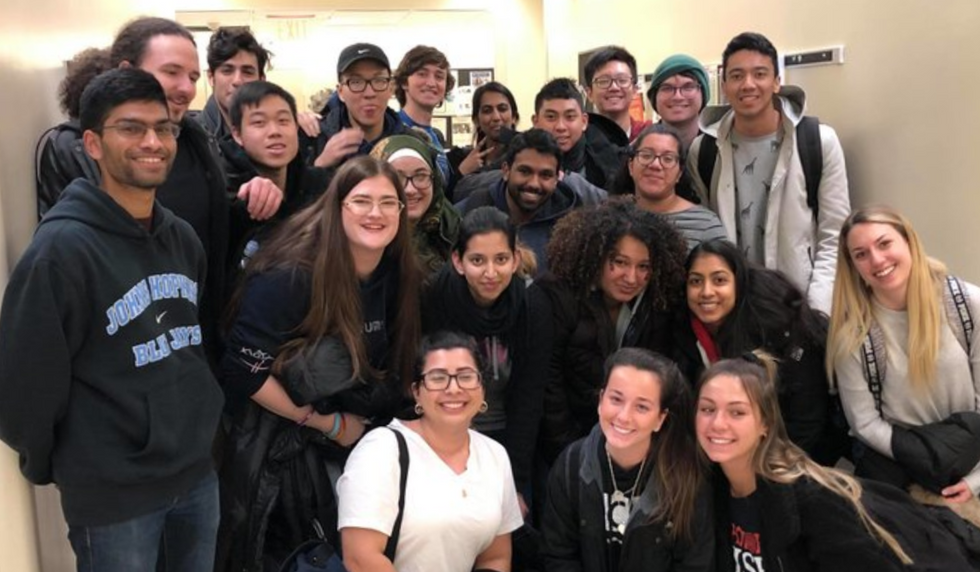This past semester, I had the great honor of being an adjunct lecturer and instructor for our BIO 204 class at Stony Brook University, in which I led a section through its respective activities in order to learn the nuances of scientific research and discovery. I was fortunate to have such a wonderful opportunity to pass on the knowledge that I had accrued when taking the class three years ago, and I looked forward to the challenge of being a guide for the bright students under my wing.
I remembered the struggles that I had dealt with as a student in that class, and I aspired to teach in a relaxed style in order to easily mediate the line between expecting quality work and being too demanding of my students. While I was excited about this opportunity, I was also completely unaware of the hectic time-frame of a graduate instructor who had his own classes on top of teaching duties, and so I embarked without a clue of the responsibilities expected of me.
My experiences as a lecturer for a class that I had already taken as an undergraduate showed me the clear reality of education from an instructor's point of view. BIO 204 is known at Stony Brook for being an extremely disorganized, difficult lab course replete with misleading instructions on how to handle procedures, a plethora of lab reports seemingly designed to frustrate students based on structure and content, and supposedly inconsistent criteria for weighing points based on the instructor of a specific section.
When I took the course in 2015, I felt just as frustrated as anyone else would have as a student — despite my best efforts, I wasn't performing up to my standards, and yet I felt as if it was the fault of the various TAs in the class (with their ever-changing advice) that I was doing poorly. As an instructor of the class, however, I finally saw the flip side of the situation, as myself and other instructors were bogged down by the various assignments we were supposed to have completed before and after labs in order to seamlessly transition from one activity to the next every week.
From grading multiple lab reports over Thanksgiving to answering exhausting emails regarding quizzes and assignments, my fellow instructors and I were shown that the rosy image of professors judging students and determining final grades on a whim (as was my thought process when I was a student) was a far cry from reality.
Our head professors and we adjunct lecturers were frantically working against the clock to manage a class of well over 1,000 students in order to approximate a fair grade distribution based on a plethora of assignments. Every lab report, every assignment, and every performance grade was checked several times over by multiple instructors as well as by the head instructors of the class to ensure an even playing field — a task that had most of us exhausted from sheer stress alone.
Worse still was the flurry of emails I would have to attend to from students regarding their grades. I tried to maintain my patience and remember that I was once a student just like them trying to prove myself at a top class university (and I truly admired their efforts to stay ahead and work hard for the grades they felt they deserved), but by Thanksgiving break I had essentially burned out from constant panic of those taking the class. It felt frustrating to have to explain the numerical breakdown of why some received the scores that they did, so much so that I was forced to take a step back and reevaluate the reasons as to why I had wanted to teach in the first place.
I felt that everyone (myself and other instructors included) was simply caught up in the numbers and that no one was paying attention to actually disseminating the knowledge that the course had the potential to provide about scientific inquiry and discovery of the natural world. I could see the stress begin to pile on my own students' faces as they would trudge into class, beset by the strain of the workload accumulating from their BIO 203 and organic chemistry classes alongside this one.
For this reason, I tried to be as flexible as I could be with deadlines such that my students could eat properly, sleep properly, and have some time for themselves without self-destructing. I made a concerted effort to preach self-care above all else so that the bright minds under my wing would remember that their health and happiness were worth far more than an arbitrary assignment of a letter grade.
With whatever power we could, my fellow instructors and I tried our best to make learning the material of the class as interactive as possible, to help inspire these undergraduates to become the best version of themselves that they could be.
Despite the struggles of BIO 204, I was proud to be an adjunct instructor, especially so because I was able to see the students under my wing grow throughout the semester into seasoned professionals of scientific innovation and discovery. I am proud of what all of them were able to accomplish, and I learned firsthand why so many academics pursue teaching as a profession above all else. I am very thankful that I was able to have this opportunity to pass on knowledge to others.





 Christmas and New Year gift card
Photo by
Christmas and New Year gift card
Photo by  butter cookies on plate
Photo by
butter cookies on plate
Photo by  boy holding Holy
boy holding Holy 










